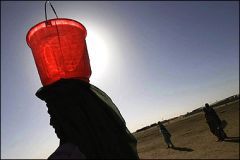Six-way summit to discuss Darfur crisis in Libya
By Yang Wenjing, Ming Jinwei
CAIRO, May 15, 2005 (Xinhua) — A six-way African summit will be held Monday in the Libyan capital Tripoli to probe means of solving the26-month crisis in Sudan’s western region of Darfur.

|
|
A displaced Sudanese woman carries a bucket of water in the Abu Shouk camp on the outskirts of the northern Darfur town of El-Fasher. (AFP). |
The summit, which will be attended by leaders from Egypt, Libya, Nigeria, Sudan, Chad and Gabon, was originally scheduled to take place in the Egyptian Red Sea resort of Sharm el-Sheikh on May 15-16.
No reason of the venue change is yet known, but Libya, which hosted a five-way summit on Darfur in October 2004, was reportedly keen to play a major role in solving the Darfur crisis.
The six-way summit is being held in implementation of an item in the final communique of the five-way summit which stressed rejection of foreign interference in Darfur affairs while emphasizing the key role of the African Union in settling the crisis in line with Sudan’s sovereignty and territorial integrity.
Sudanese Foreign Minister Mustafa Osman Ismail said Saturday that the aim of the conference was to “set the stage for reaching a quick solution to the Darfur crisis.”
The summit will discuss consequences of a UN Security Council resolution calling for war crime suspects in Darfur to be tried before the International Criminal Court. The Sudanese government rejected the resolution as infringing on its sovereignty.
The UN Security Council approved a resolution in late March, demanding prosecution before the Hague-based international court of51 suspects accused of human rights violations in Darfur.
Meanwhile, as a leading mediator of the Darfur issue, Arab League (AL) Secretary General Amr Moussa was also invited to attend the six-way summit.
In statements to the press before heading for Libya, Moussa said that the league’s participation in the summit will be the first for the pan-Arab body at such a level, though not the first time for the league to attend meetings on Darfur.
He praised cooperation between the Arab League and the African Union regarding the Darfur problem, asserting that the league’s participation in the summit was the fruition of such cooperation.
Earlier, his spokesman Hossam Zaki said that the Arab League hoped the summit will contribute to the search for peace in the war-torn western region of Sudan.
“I hope that the Libya summit will represent an important step on the way to achieving a solution to the situation in Darfur,” said Zaki.
He added that the Darfur problem is given priority by Moussa in his contacts and consultations with officials and politicians in various world countries.
Libyan leader Omar Muammer al-Ghaddafi has invited Darfur’s two main ethnic minority rebel groups — the Sudan Liberation Movement and the Justice and Equality Movement — to participate in the talks.
The rebels have accused the Arab-dominated regime in Khartoum of pursuing a “war of extermination” against Darfur’s indigenous minorities since they launched their “uprising” two years ago. Libya’s Jana news agency said Wednesday that the two rebel groups and four local government official in Darfur signed a truce and humanitarian aid agreement before Ghaddafi.
Clashes in Sudan’s Darfur flared up in February 2003 when local black African farmers took up arms to fight horse-mounted Arab militia, known as Janjaweed, who were accused of large-scales of killing, rape, looting and burning.
The conflict has so far caused many deaths and sent thousands of others fleeing to neighboring Chad or internally displaced. Under a UN Security Council resolution in September last year, the Sudanese government was urged to rein in militia, protect local people, prosecute those responsible for killings and allow more AU monitoring troops into the conflicting region.
Although the Darfur crisis was virtually an internal affair, which should demand mainly the efforts by the Sudanese government, yet there were international powers wielding significant influence upon the issue.
It made the issue become ever more complicating and its prospects were never further from being certain.
However, the leaders of the six African countries hoped to help Sudanese government to solve the Darfur crisis within a completely African framework.
